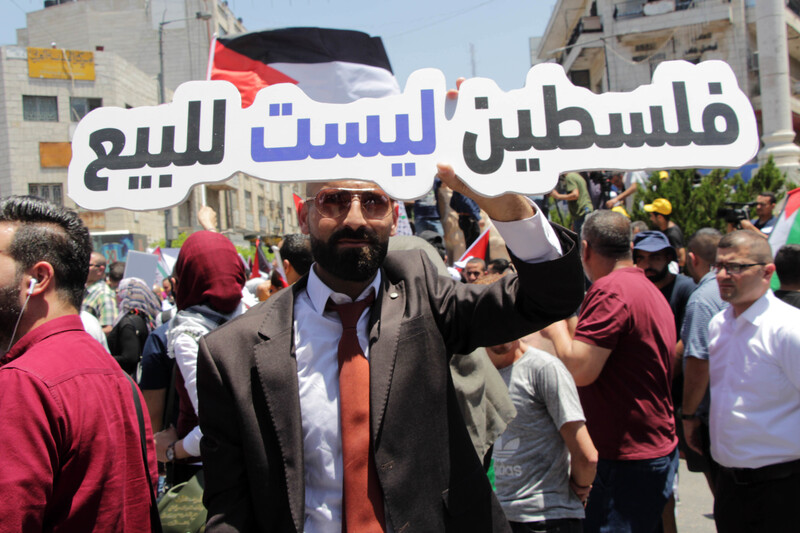Rights and Accountability 25 June 2019

A protester in the West Bank city of Ramallah holds a sign reading “Palestine is not for sale,” 24 June 2019.
APA imagesWhile the Trump administration goes through the motions of its doomed Bahrain peace summit, Israel is tightening the screws on Gaza’s long-suffering two million Palestinians.
Israel announced on Tuesday that it had indefinitely halted the transfer of fuel into the territory “following the launching of incendiary balloons from Gaza.”
The ban on fuel transfers to Gaza’s sole and aging power station will drastically reduce the number of hours of electricity available to residents during the sweltering summer heat.
The measure comes days after Israel lifted its week-long maritime closure of Gaza’s coastal waters.Israel’s total prohibition on Gaza fishers from working their trade was also a collective punishment measure imposed due to incendiary balloons and kites launched from the territory.
The punishment of a civilian population over acts for which they bear no responsibility is prohibited under the Fourth Geneva Convention, which was ratified by Israel.The International Committee of the Red Cross holds that the air, land and sea blockade on Gaza, imposed since 2007, “constitutes a collective punishment imposed in clear violation of Israel’s obligations under international humanitarian law.”
Last year, the World Bank said that Gaza’s economy was “in free fall” after more than a decade of blockade, successive Israeli military assaults and internal division between Palestinian factions.
“The result is an alarming situation with every second person living in poverty and the unemployment rate for its overwhelmingly young population at over 70 percent,” the World Bank added.
Ismail Haniyeh, the political leader of Hamas, accused Israel last week of “foot dragging” by failing to implement understandings reached through indirect talks coordinated by Egypt and the United Nations.
Those understandings include electricity and job-creation projects and increased cash flow into Gaza.
Haniyeh also said that Israel’s frequent increased restrictions on Gaza fishers was “a policy of extortion.”
Under the Oslo accords signed by Israel and the Palestine Liberation Organization a quarter of a century ago, fishers are permitted to sail up to 20 nautical miles out from Gaza’s coastal waters.
Israel has never allowed Palestinians access beyond 15 nautical miles, however, and that expanded limit was only introduced for part of Gaza’s coast on 1 April this year.
Israeli restrictions on the movement of Palestinian fishers and the export of their catch “has led the sector to collapse,” according to the human rights group B’Tselem.
“In 2000, there were 10,000 registered fishermen in Gaza; now there are about 3,700,” B’Tselem states.
“In practice, only about half of the registered fishermen actually fish, as many cannot use their boats due to the lack of supplies to repair them or build new ones, or because the military confiscated the boats.”
Nearly all of Gaza’s fishers live below the poverty line of $4.60 per day.
The premise of the US-sponsored conference in Bahrain that began on Tuesday is that economic investment “will empower the Palestinian people to build a better future for themselves and their children.”
Rehashed “economic peace”
The Trump administration’s “Peace to Prosperity” plan was published online a few days ago.
As noted by The Electronic Intifada’s Ali Abunimah, “the plan amounts to reheated ideas for ‘economic peace’ – the hope that a few financial crumbs will buy Palestinians off from demanding liberation and from continuing to resist Israel’s system of occupation, settler-colonialism and apartheid.”
Omar Shakir, the director of Human Rights Watch’s Jerusalem office, observes that the Trump administration’s “40-page document says nothing about why Palestinians are disempowered today and unable to unlock their potential.”
In 2013 the World Bank estimated that Israeli restrictions on Palestinians in Area C – the 60 percent of the West Bank under full military control – costs the Palestinian economy $3.4 billion each year.
Israeli restrictions in Area C and the blockade on Gaza “represent the biggest challenges to growth, and their removal can generate momentous economic benefits,” the World Bank more recently stated.
Instead of calling on Israel to lift those restrictions that have caused the Palestinian economy to decline, American officials visiting Area C this week applauded “the extraordinary importance of Israel’s control of this territory,” in the words of David Friedman, the US ambassador to Israel.
Friedman, a longtime funder of Israel’s settlements built in violation of international law, has previously stated that Israel has the right to annex West Bank land.
John Bolton, national security adviser to Trump, echoed Friedman’s remarks, stating that he “saw firsthand the strategic importance that these locations have on Israel’s national security.” He added that Trump’s executive order recognizing Israel’s claim of sovereignty over the Golan Heights was an acknowledgement that “for Israel to defend itself, it cannot relinquish strategic ground along its border.”The Golan Heights is Syrian territory captured by Israel during the 1967 war along with the Palestinian West Bank and Gaza Strip, and Egypt’s Sinai Peninsula, from which Israel eventually withdrew.
Like collective punishment, the acquisition of territory by war is prohibited under international law.
A keyword search for “international law” in the “Peace to Prosperity” document yields no results.





